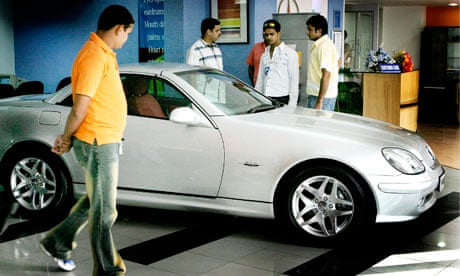The Indian environment minister, Jairam Ramesh, has attacked the growing Indian taste for the American lifestyle, which he called the "most unsustainable in the world today".
In an interview with the Guardian, Ramesh, who will travel this weekend to Cancun in Mexico for the next round of global climate negotiations, said the world was paying the price for "the US model of development" which, he said, India and China have embraced.
"It is a paradigm fraught with grave risks. I shudder to think what will happen if we [in India] follow the suburban model of urbanisation," said Ramesh, who has established a reputation as one of the most proactive Indian environment ministers for many years.
"You can't blame the Americans. The US lifestyle has become the world lifestyle. [But] if we are going to replicate this model, it is a recipe for disaster for India as well as for the rest of the world. We should be showing the way … not just saying we are going to pay this price."
Ramesh has hit headlines in India with a series of decisions to halt industrial or infrastructure projects on environmental grounds, which have infuriated commercial lobbies and sometimes cabinet colleagues. He said there were many in India who wanted the country to "grow now, pay later. They say, let's follow the western model – or even the Chinese model."
Ramesh, who is a member of parliament for the governing Congress party in the central state of Andhra Pradesh, provoked controversy in India last week by calling the use of large SUV-type vehicles in urban areas "criminal". Such large and luxurious cars are seen as an essential symbol of success and status by India's increasingly wealthy upper-middle class, and there is a growing number on the country's choked roads.
But the 56-year-old former minister of power said such vehicles ran on fuel that is subsidised to help poor farmers.
He also spoke of his recent decision to cancel a hydroelectric project in the Himalayas to generate power for Delhi, which suffers chronic blackouts, asking: "Why should you cut forests in [the Himalayas] to feed the water demand of these farmhouses outside Delhi?" – a reference to the ranch-style residences on the capital's outskirts, popular with the wealthy. At a conference last week, the minister told an audience of businessmen that his ministry had cleared the vast majority of projects.
On Monday, Ramesh approved the building of a second airport for Mumbai, India's commercial capital, despite opposition from conservationists.
However, in recent months, he has ordered mining company Vedanta Resources to halt the expansion of its aluminium refinery in the eastern state of Orissa and denied the company permission to mine in Orissa's Niyamgiri Hills, an area deemed sacred by a local tribe. A decision on a controversial £8bn steel project by Posco, a South Korean company, is expected in the coming weeks.
Ramesh said "his whole endeavour" was to make environmentalism mainstream by linking it with public health.
"The environmental issue in India has been seen to be largely an upper-middle class elitist issue," the minister told the Guardian. "I believe that a larger number of Indians are actually concerned about the environment than we give credit for."
Hundreds of millions were worried about health issues, the causes of which were oftenproblems caused by pollution or land degradation, he said, adding that a new public health initiative, partly funded by the Bill Gates Foundation, would be launched in the coming weeks and would "transform perceptions".. A public health initiative, to be launched soon with funding from the Bill Gates Foundation, would transform perceptions, he added.
India has been repeatedly criticised by western powers for taking a confrontational position in climate-change negotiations. Ramesh warned that he had to "protect Indian economic interests", describing the Cancun meeting as "all about politics, not the environment".
Ramesh echoed other senior officials who have sought to lower expectations of next week's ministerial talks, saying that he did not expect any breakthrough. Cancun could however prove useful in creating "building blocks" towards a final agreement, he said.
